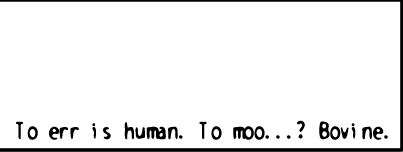 |
|||||
 |
|||||
News of 2004
WASHINGTON -- After four years of legal rangling, George W. Bush was finally declared the winner of the 2000 presidential election yesterday. Bush, a Republican, will take the oath of office at noon today and serves until Jan. 20, 2005, a term of about three weeks.
Then he gives way to the winner of the 2004 presidential election, New York Sen. Hillary Rodham Clinton. Facing a drastically shortened presidency, Bush attempted to strike an optimistic tone last night.
"We have a lot to accomplish in the next three weeks," Bush said. "Reforming Social Security alone is probably going to eat up four-five hours. Let's get to work!"
Aides yesterday were calling temporary employment agencies in a frantic effort to fill Cabinet posts. Bush's victory ends a four-year court battle between him and Democratic candidate Al Gore over the results of the 2000 election.
While the dispute raged on, the nation installed an interim president: New York Yankees Manager Joe Torre. Torre admitted that running a country and a baseball team simultaneously has been a strain. "At times, it's been difficult to keep the two things straight. Although, in retrospect, trading Jesse Helms to the Red Sox turned out OK."
Torre's four years in office were marked by continued prosperity at home and relative calm abroad. His most controversial move was appointing Yankees bench coach Don Zimmer to the Supreme Court. Critics charged that Zimmer lacked experience. He also spit tobacco juice on Antonin Scalia's shoes, angering conservatives.
Torre's boldest foreign policy initiative was making Cuba the 51st state in an effort to improve U.S. pitching. Torre was planning to vacate the White House by midnight tonight, with Bush moving in immediately. Eager to give an aura of permanency to his three-week administration, Bush rebuffed suggestions that he sleep on a bare mattress on the floor and live out of suitcases.
Gore, meanwhile, has yet to concede defeat. The former vice president issued a statement today saying, "It would be improper and disrespectful to the democratic process to act hastily before all the facts are known."
The legal tangle over the 2000 election began with a Gore lawsuit over the confusing design of ballots in Florida. When the courts sided with Gore, Bush filed suit, arguing that the Oregon results were invalid because some ballots were yellow and others pink. Gore counter sued, charging that the West Virginia results should be thrown out because some people failed to receive "I Voted Today" stickers. Through the years, various officials proposed compromises to resolve the impasse.
All were rejected, including:
- Establishing a co-presidency, with the two men sharing duties and splitting the White House. Although never implemented, the idea gave rise to a hit TV show, "East Wing, West Wing."
- Establishing temporarily separate nations, with each candidate ruling the states he won in the 2000 election. Gore, who failed to carry his native Tennessee, balked at the idea because it would mean showing a passport every time he went home.
- Letting Jimmy Carter sort it all out.
Observers said the biggest challenge for the Bush administration will be working with Congress, which adjourns tomorrow and isn't expected back until after Bush's term ends. "One day may not be quite enough time to overhaul the tax system," a Bush aide admitted. "But maybe we can get started and then finish it later with a big conference call or something."
Meanwhile, Bush also must work on his legacy and prepare to transfer power to President-elect Clinton. Clinton yesterday wished Bush well and asked if she could start moving some boxes into the White House basement.